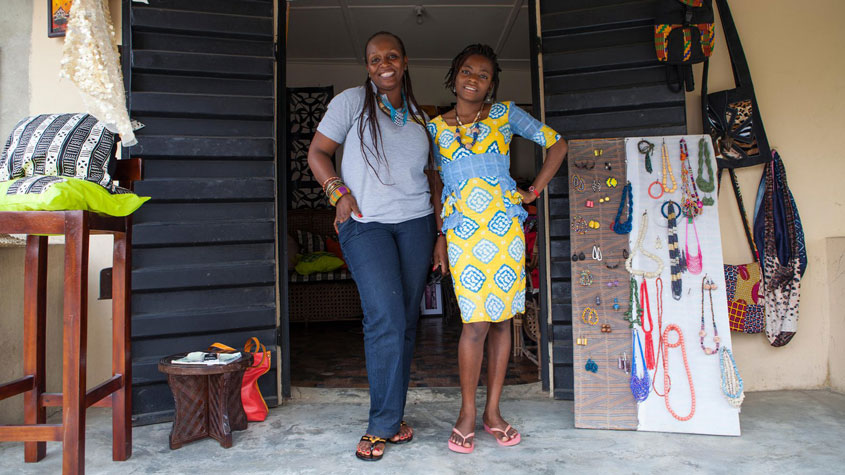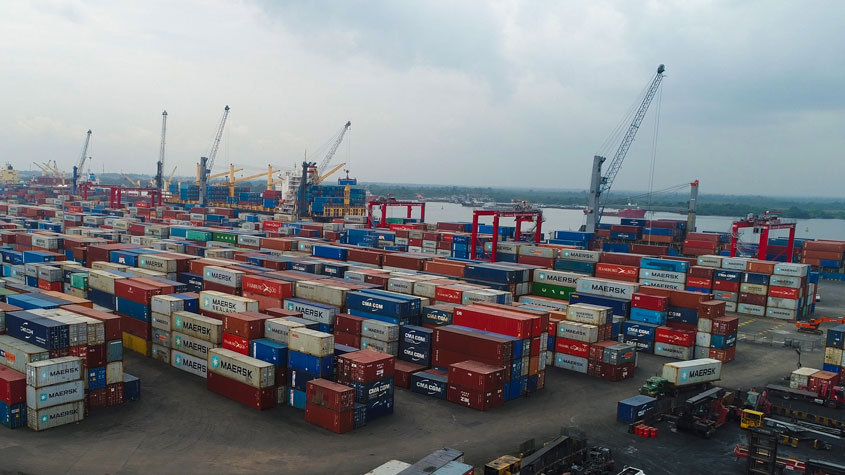


By Oyinkansola Komolafe*, University of Ibadan, Ibadan, Nigeria *Winner of the 2021 World Intellectual Property Day Essay Competition organized by the WIPO Office in Nigeria (find out more about the WIPO National IP Essay Competition 2021). Now, more than ever, countries are transitioning from resource-based economies to knowledge-driven economies. Nigeria has seemingly joined the bandwagon, as national stakeholders are beginning to recognize the role of intellectual capital as a catalyst for sustainable economic growth. This trend has become even more prominent in light of the recent coronavirus pandemic and the continued resilience of the knowledge economy amid the drastic decline in oil prices. At the centre of this renewed thirst for intellectual capital is the primary footstool of innovation − the small and medium enterprise (SME) sector. For several years, SMEs have proven to be the lifeblood of the Nigerian economy. According to business consultants PwC’s MSME Survey 2020 , SMEs contribute a whopping 49 percent to Nigeria’s GDP and account for about 99 percent of Nigeria’s businesses. Due to their high flexibility and innovation capacity, SMEs are well positioned to chart a new course for post-pandemic economic growth in Nigeria through employment generation and income redistribution. However, to optimize fully their potential, SMEs need to adequately protect and commercialize their intellectual creations. This is where intellectual property (IP) rights come into play.

Nigeria is one of the largest hubs for innovation and creativity on the African continent. Within each invention that enters the Nigerian market every day, lies a distinct idea that has the potential to be transformed into a valuable business asset for its owners. IP rights provide SMEs with the opportunity to make this transformation a reality. One of the most prominent advantages of using IP assets for SMEs is revenue generation. The exclusivity that IP rights offer enables SMEs to earn royalties and generate income from licensing their IP assets. In fact, research by the European Union has shown that SMEs that possess IP rights generate up to 68 percent more revenue than SMEs that do not. The benefits of revenue generation from IP assets are set to become more significant in light of the African Continental Free Trade Area (AfCFTA) agreement. Upon full adoption of the AfCFTA, Nigerian SMEs will be able to acquire IP rights to build the visibility of their brands and adequately protect their assets. As a result, these businesses will be in a position to sustain a competitive advantage amid the influx of new market participants. Similarly, the acquisition of IP rights could potentially place SMEs at the forefront of investment opportunities. Often, investor confidence is boosted when businesses are able to demonstrate that they have protected their valuable IP assets. The positive relationship between IP and a company’s ability to attract investors is further reinforced by PwC’s report entitled Impact of Intellectual Property Infringement on Businesses and the Nigerian Economy, which showed that a one percent improvement in trademark and copyright protection could increase foreign investment by 3.8 percent and 6.8 percent, respectively. The prospect of such international capital flows is crucial for Nigeria at this time, as it could potentially accelerate job creation and in turn, reduce the scourge of the coronavirus-induced unemployment that the country is currently battling. Despite the many benefits that IP utilization presents for SMEs, levels of IP protection among Nigerian SMEs remain abysmally low. According to the 2013 Small and Medium Enterprise Development Agency of Nigeria and the National Bureau of Statistics Collaborative Survey , of Nigeria’s 41 million SMEs, a staggering 70 percent have no form of protection over their intellectual creations. This situation is due to a number of bottlenecks.

One of the major barriers to IP utilisation by SMEs is the low rate of IP awareness. SMEs often do not know how to protect their creations or which ones to protect. This is because a large number of Nigerian SMEs still operate within the informal economy where IP literacy is particularly low and cultural motivations often shape perceptions about IP protection. Cost is another major barrier. Even among SMEs that are fully aware of the benefits of IP rights for their business operations, high IP protection costs are a major hindrance. In Nigeria, for example, the cost of a patent application typically comes in at around USD 1,500 (approximately ₦ 619,000), with the inclusion of legal fees – a sum that accounts for the entire capital of some Nigerian SMEs. As finances are a problem for many SMEs, these high costs are a major disincentive for IP protection. In addition, the weak enforcement of IP rights in Nigeria has put a brake on innovation and IP protection by SMEs. A case in point is the overwhelming prevalence of piracy in the country. Every year, Nigeria loses about USD 3 billion to piracy. The prevalence of piracy is seemingly affirmed by Nigeria’s abysmally low share in Africa’s annual royalty collections in spite of the fact that the country’s creative industry is one of the largest in Africa. CISAC’s Global Collections Report 2020 shows that Algeria, Morocco, and South Africa accounted for more than 70 percent of the continent's royalty collections in 2020. With external pirates hijacking the bulk of the revenue that should ordinarily accrue to creators, there is little incentive for SMEs to keep innovating, creating or investing in the protection of their creations. The sustained prevalence of IP infringement has resulted in an apathetic attitude towards IP protection.
For Nigeria to be able to utilise IP to enhance the competitiveness of its SMEs, it needs to adopt a triple-pronged strategy involving IP awareness and cost reduction, stricter IP enforcement, and assistance on IP commercialization.
In order to tackle the widespread lack of knowledge among SMEs about the nature and protection of IP, there is a need to conduct on-site awareness about the importance of IP assets and how these assets make businesses more competitive. These on-site awareness programs would target specific SME clusters like the Onitsha market in Anambra, the Yaba market in Lagos, and the Kurmi market in Kano. Subsequently, a special legal assistance initiative should be established for SMEs. The WIPO Nigeria Office could lend its weight to this strategy by establishing partnerships with law firms that would be willing to provide free advisory services to SMEs on patent or trademark filings. As legal services often constitute the bulk of the costs incurred during the process of filing for IP rights, such a strategy would lift a major financial burden from the shoulders of SMEs, thereby, incentivizing IP protection. A similar strategy has proven effective in the USA, where hundreds of indigent American SMEs have benefited from such assistance in protecting their inventions.
A special IP enforcement force could be created to clamp down on IP infringement. It would involve intensive inter-agency cooperation between relevant institutions like the Nigerian Copyright Commission (NCC), the Standards Organisation of Nigeria (SON), and the Nigeria Customs Service. Such a move would help to curtail the prevalence of IP infringement within the domestic market, while also stemming the influx of pirated products from other countries. By adopting this measure, Nigeria would be able to restore public trust in its IP enforcement system, thereby, further incentivizing businesses to protect their creations.
A national strategy that supports IP commercialization is particularly important, as the ability to drive economic growth through SMEs is determined, to a large extent, by the commercialization of IP assets. A government program to encourage IP-backed financing would go a long way in supporting SMEs in commercializing their IP assets. With such a program, SMEs would be able to gain access to credit facilities by using their IP assets as collateral. This would further broaden SMEs’ access to finance and subsequently boost their ability to compete effectively in the market. While Nigerian financial institutions may generally have a low appetite for IP collateralization due to valuation issues, this challenge can be bypassed through the creation of a standardized IP valuation model by the Trademarks, Patents, and Designs Registry.
A national strategy that supports IP commercialization is particularly important, as the ability to drive economic growth through SMEs is determined, to a large extent, by the commercialization of IP assets.

Alternatively, a digital IP marketplace could be established for innovative SMEs to sell or license their IP rights. Domestic and international investors interested in investing in Nigeria’s IP assets may equally apply to buy IP rights through the platform. This strategy would help SMEs significantly in gaining ready access to a market for the commercialization of their IP assets. Denmark adopted a similar strategy in 2007, and it has produced impressive results. Since the establishment of the Danish IP Marketplace, several SMEs have licensed their IP rights through the platform. In conclusion, the outbreak of the coronavirus pandemic has dealt a huge blow to the Nigerian economy. However, with the intellectual assets of its SMEs, Nigeria will be able to carve a new path towards recovering from its current economic woes. As such, it is imperative for Nigeria to align its policies towards creating an environment that incentivizes its SMEs to continuously innovate and commercialize their innovations. This way, the country will be able to optimize the potential of its SMEs to achieve unprecedented levels of economic growth.
In April 2021, the WIPO Nigeria Office launched the second WIPO National IP Essay Competition as part of its 2021 World Intellectual Property Day celebrations in Nigeria, on the theme IP and SMEs: Taking your ideas to market. With a key objective of promoting research and learning in the field of intellectual property, the competition was open to all students attending tertiary institutions in Nigeria. Entrants were required to submit an essay of 1500 words addressing the theme Intellectual Property, SMEs and Economic Recovery in Nigeria. The competition attracted 143 entries from 29 tertiary institutions and 19 distinct disciplines. An expert panel of 18 judges was appointed by the WIPO Nigeria Office to assess the entries. They identified 15 finalists and three winners, each of whom received WIPO Certificates of Achievement, scholarships for WIPO Distance Learning courses, professional IP internship or innovation fellowship opportunities, a WIPO sponsored IP Study Tour to Abuja, and WIPO resources and materials. Additionally, the overall winner, Oyinkansola Komolafe, received a WIPO scholarship to participate in the blended Advanced International Certificate Course on IP Asset Management (AICC), while the joint first runners-up received scholarships for the WIPO Summer School in South Africa.
The WIPO Magazine is intended to help broaden public understanding of intellectual property and of WIPO’s work, and is not an official document of WIPO. The designations employed and the presentation of material throughout this publication do not imply the expression of any opinion whatsoever on the part of WIPO concerning the legal status of any country, territory or area or of its authorities, or concerning the delimitation of its frontiers or boundaries. This publication is not intended to reflect the views of the Member States or the WIPO Secretariat. The mention of specific companies or products of manufacturers does not imply that they are endorsed or recommended by WIPO in preference to others of a similar nature that are not mentioned.